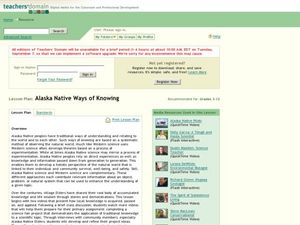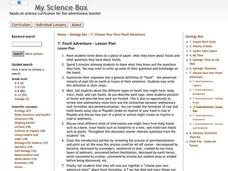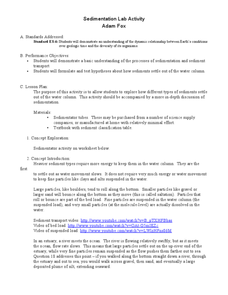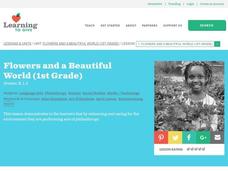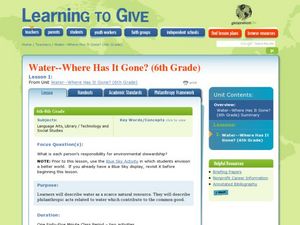NOAA
What's the Difference?
Due to the isolation of seamounts, their biodiversity offers a great deal of information on the development of biological and physical processes. Pupils use simple cluster analysis to rate the similarity and differences in biological...
NOAA
A Matter of Density
Larvae transportation on the New England seamounts is based on the density of the water. Scholars calculate density and graph salinity versus temperature to better understand the distribution of organisms in a water column. Discussions...
NASA
Is It Alive?
Determining whether or not something is living can be more difficult than it seems. Put your young scientists to work defining their own criteria to identify life, then work with three samples to see if they are alive or not.
NOAA
Where Have All the Glaciers Gone?
What happens when ice melts? Well ... water happens. When that melting ice is a glacier, the amount of water that results produces change throughout the world. Middle school science sleuths uncover the truth about global warming, the...
NOAA
The Oceanographic Yo-yo
How does chemistry help deep-sea explorers? Part four of a five-part series of lessons from aboard the Okeanos Explorer introduces middle school scientists to technologies used in ocean exploration. Groups work together to analyze data...
Curated OER
To The Clock of Eras
Third graders investigate the events of geological time using a chart called a "Clock of Eras". In this geological events lesson plan, 3rd graders compare a standard clock to a geological clock. In addition, students consider periods...
Curated OER
Alaska Native Ways of Knowing
Pupils watch a video on the Alaskan native ways. They examine how knowledge was passed down from elders and how the Alaskans lived with harmony in nature. Learners then prepare and present a classroom science fair project based on their...
Virginia Department of Education
Mineral Identification
What's the difference between a rock and a mineral? And what properties are used to identify minerals? The first installment of a five-part series on earth materials and processes prompts young scientists to identify a set of...
Virginia Department of Education
Three Types of Rocks
Rock out with the second installment of a five-part series on earth materials and processes. Your budding geologists make observations of given rock samples and posit classification systems for rocks. They then learn about the accepted...
Curated OER
The Earth Around Us: Air, Water & Soil
Second graders explore erosion and find the factors effecting erosion of hillsides. In this erosion lesson, 2nd graders experiment by creating a hillside and simulating rain. Students discuss and record their results on a worksheet.
Curated OER
Earth Energy Budget Pre Lab
Learners explore energy by conducting an in class experiment. In this climate change lesson, students conduct a water vapor experiment in a soda bottle. Learners utilize graphs and charts to analyze the results of the experiment and help...
Curated OER
The Earth Around Us: Air, Water & Soil
Students build an air cannon and study air mass. In this air cannon lesson, students create and shoot an air cannon and observe what happens. Students answer critical thinking questions about air mass and air cannons.
Curated OER
Cooler in the Shadows
Students explore Earth science by creating a scale model in class. In this shadow lesson, students research the impact the sun has on Earth shadows and complete a space science worksheet. Students create models of the Sun and Earth and...
Curated OER
Weathering and Erosion
Young scholars perform experiments to simulate weathering and erosion. In this earth science lesson, students view a PowerPoint presentation that includes weathering, erosion, and the Dust Bowl. Young scholars conduct a series of...
Curated OER
Fossil Adventure
Students create a book about the process of a dinosaur becoming a fossil. In this earth science instructional activity, students are taught about fossils and create a book that tells what happened to a dinosaur's bones after they die.
Curated OER
Internet Quest: Weatherman Walt-Why the Sky is Blue
Students analyze atmosphere and light. In this earth science instructional activity, students are introduced to an investigation about why the sky is blue. Students complete a WebQuest to answer the question.
Curated OER
Clouds
Students explore basic cloud types and the weather associated with each one. In this earth science lesson, students participate in numerous activities including going outside to observe the clouds they see, making a cloud in a jar,...
Curated OER
Introduction to Minerals
Students discover how crystal structures go together to create minerals. In this earth science lesson, students work in groups to create 3-dimensional shapes of crystals that they then put together in a compact structure.
Curated OER
Sedimentation Lab Activity
Students predict how sediments in a water column will settle. In this earth science lesson, students examine the layers of sedimentation. Students are given sediments to place into a column of water and observe how they settle....
Curated OER
Scientists Discover Giant Frog Fossil
Students examine a world map and read a news article about the discovery of a giant frog fossil. In this earth science and current event lesson plan, the teacher introduces an article with a discussion about continental drift and a...
Curated OER
Prehistoric Discoveries
Students agree or disagree with several statements about ancient animals, then read a news article about recent prehistoric discoveries. In this earth science and current events lesson, the teacher introduces the article with a...
Curated OER
Flowers and a Beautiful World: Earth Day (1st)
Learners consider caring for their environment. In this environmental stewardship lesson, students read Miss Rumphius and discuss how sharing their time, talent, and treasure through volunteering makes the world better.
Curated OER
Pollution Solutions: Earth Day
Eighth graders explore water pollution. In this stewardship instructional activity, 8th graders draw comparisons between potable and impaired waters. Students use the Learning Link website to examine ways people are fighting pollution...
Curated OER
Water--Where Has It Gone?: Earth Day
Students explore the concept of philanthropy. For this environmental stewardship lesson, students consider the plight of water as they consider water use and distribution. Students listen to an excerpt from The Well and consider...
Other popular searches
- Earth Science Moon Phases
- Branches of Earth Science
- Earth Science Minerals
- Earth Science Inquiry
- Earth Science Lesson
- Earth Science Lesson Plans
- Basic Earth Science
- And Earth Science
- Earth Science Map Reading
- Earth Science and Art
- Earth Science Vocabulary
- Science Earth Layers








